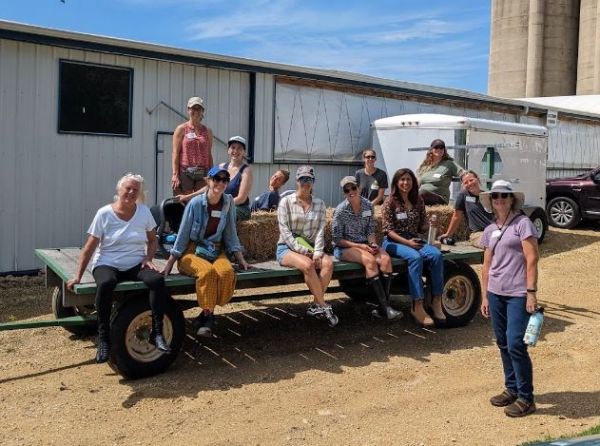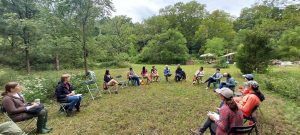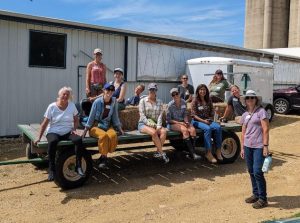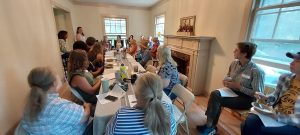
Women Farmland Owners Encircle for Community and Collaboration
“If you’re going to farm, make sure you find land with a forest.” This tip, shared at one of the Learning Circles this year, resonates at a couple of frequencies:
First, it relates to the partnership between TLC’s farm program and the Savanna Institute. TLC was selected by the Savanna Institute to help with their mission of increasing agroforestry practices on the landscape. Why? Agroforestry, integrating tree crops with other crops and livestock, offers farmers and landowners the opportunity to meet conservation goals while keeping land in production. Practices like alley-cropping and riparian buffers have been shown to improve water quality – and McHenry County has been identified as a priority watershed for managing agricultural runoff to the Gulf of Mexico. How we’re farming here has an impact downstream.

Second, we tend to think of farms as individual entities, but the women farmland owners in these Learning Circles know intuitively that it’s the forest, the broader community, and the ecosystem that feeds and circulates through our pursuits.
So, the women come to share and explore their “joy of the land” – among them, farmers, teachers, artists, gardeners, students, florists, nurses, writers, conservationists, caretakers, a real estate agent, a play worker, a veterinarian. They’re a treasure ‘grove’ of experiences.
This summer, TLC held three Women Caring for the Land Learning Circles. Learning Circles are designed to create peer-to-peer networks that support women landowners who want to implement conservation practices on their farms. The events engage participants in conversations about their land, connect them with one another and empower them to try something new.
Learning Circles focus on land access, knowing that this is one of the top concerns of beginning farmers, and why TLC as a land trust, is concerned with farmland in the first place. How do we preserve and protect farmland? How do we assist farmers in their conservation efforts? Can we be a creative or collaborative partner in land access?
Other topics include rotational grazing, family farming, conservation plans, permaculture design and community building. This summer, participants visited Wanda Farm in Hebron, Garlic eScape Farm in Woodstock, and Wonderland Community Project in Wonder Lake. They also met professionals from organizations such as Natural Resources Conservation Service, McHenry Soil and Water Conservation District, Pheasants Forever, and the Working Farms Fund.

A few themes arose from this season’s Learning Circles, as participants were feeling the burdens that come with growing food, sustaining their families and holding onto hope – all in the belly of climate change. How do we balance excitement without feeling overwhelmed? How can we build skills for resilience? How do you work within the mentality that you and your generation won’t benefit from this work?
The questions and answers flow freely.
“We do what we can do; make what we can make.” Creativity often bubbles up as a solution, as well as seeing themselves as connected with nature. “Love of nature creates more drive than knowledge,” a nature play worker assured the group. They know nature is their guide in stewarding the land. One participant noted that she looks to beavers for inspiration, “their work is messy, but they have a purpose.” And as hard as it is for some of these go-getters to accept, you can feel them slowly releasing during these conversations, as they admit their work is a “slow and intentional process.”
The women landowners balance doubt and possibility, and readily share their light. There is solace in the collective exhaustion of August, and a new spark when you hear someone’s dream of “bringing life back to the farm.” Or better yet, when you hear how someone brought their conservation goals into practice on their farm.
We are looking forward to hosting a winter Learning Circle this year to help landowners plan for the coming growing season. Stay tuned for details!
